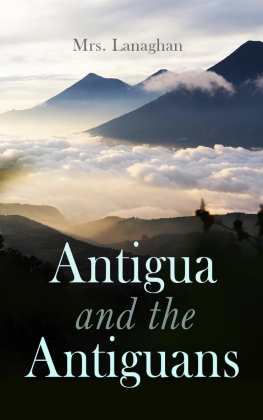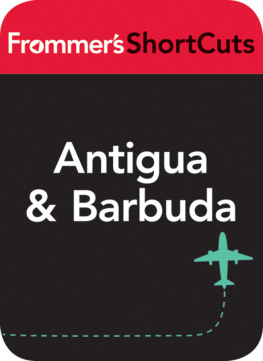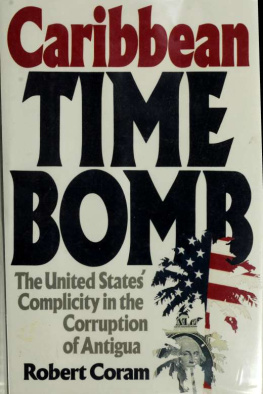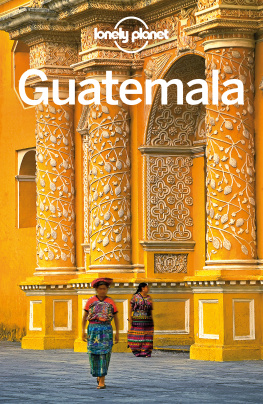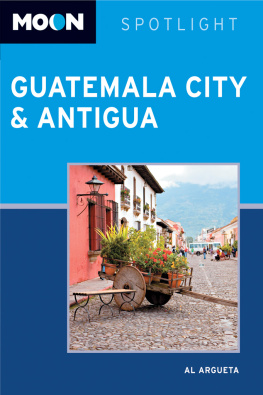CHAPTER I.
General Description of the IslandAppearanceSoilProductionsClimateEarly historyDiscovery by ColumbusAttempted settlement by SpaniardsGrant to Earl of CarlisleSettlement by dEsnambucWilliamsGovernor WarnerAccount of Sir Thomas Warner, founder of the family.
The Island of Antigua, one of the great Antilles, is situated in the Caribbean Sea, about twenty-five miles to the north-east of Montserrat, and forty miles north of Guadaloupe, in latitude seventeen degrees north, and longitude sixty-two degrees, or thereabouts, the measurement in these respects not being more exact than those of its length and breadth, which are variously stated at 21, 20, and 18 miles for its length, and 21, 20, and 17, for its breadth. The lower estimate is, however, most probably correct. Its circumference, again, is variously stated at from 50 to 80 miles, and its total area from 59,838 acres, to 108 square miles, or nearly 70,000 acres. The population in 1837, consisted of 2000 whites and coloured people, and 33,000 blacks. All the slaves in the island were enfranchised in 1834.
The island is of an oval shape. On the first approach the coast appears rough and barren, but as the voyager draws nearer, hills and valleys open on his view, and the shore puts on an appearance of luxuriant vegetation. The country possesses little of a mountainous character, the highest elevation reaching only to the height of 1210 feet above the level of the sea. The soil varies according to the situation; that of the valleys and low lands consisting of a rich, black mould, on a substratum of clay; and unless in seasons of excessive drought, to which this island is peculiarly subject, remarkably productive. The soil of the high lands, on the other hand, is a stiff, reddish clay, on a substratum of marl, and is much less productive, abounding, as it does, with a species of grass extremely difficult to extirpate; and the increase of which has even caused some lands, formerly cultivated, to be abandoned. With the exception of such tracts, and of a small part totally unimprovable, the whole island may be said to be under cultivation. The staple production is sugar; a little cotton is cultivated; but all other articles of commerce, with the exception of sugar, are neglected. The quantities of ground provisions, as yams, eddoes, sweet potatoes, &c., grown in favourable seasons, is very considerable.
The most remarkable circumstance connected with Antigua is the want of fresh-water springs, there being but two or three of them, wholly inadequate to the wants of the population. This want is supplied by tanks, in which the rain water is preserved, and found to be particularly wholesome and agreeable, being light and pleasing to the palate.
The climate is remarkable for want of moisture, although the average fall of rain is forty-five inches. It is considered one of the most healthy in the West Indies.
The history of Antigua may be said to commence with its discovery by Columbus, for although it was at that period, and subsequently, frequented by the Caribs, they appear not to have made it a place of permanent residence; the want of water, which caused European settlers so long to neglect the island, deterring them also from establishing themselves upon it. For an account of the Caribs, and of their probable origin, the reader is referred to the chapters devoted to that interesting subject; and we shall now proceed to the history of the settlement of the island and of its internal administration down to the present time, reserving for future chapters those sketches of the island, and its inhabitants, which are the result of personal experience.
It was not until his second voyage, in the year 1493, that Columbus discovered Antigua. He landed with a party, but finding, on examination, that it was peopled only by a few Caribs, who possessed nothing that was serviceable to the Spaniards, and who were, probably, only casual visitants, and that the island was destitute of fresh water, he contented himself with giving it a name, Antigua, from the church of St. Mary of Antigua, at Seville, and abandoned it. There is a tradition that the name given to the island by the natives was Xaymaca, signifying the land of springs; but whether this lucus a non lucendo was a specimen of Caribbean wit, or, more probably, arose from a mistake on the part of the European visitants, is uncertain.
Antigua remained neglected by all the various European adventurers, who hastened in crowds to other more favoured spots, until the year 1520, when a small party of Spaniards, under the Licentiate Don Antonio Serrano, who had received letters-patent from the King of Spain to colonize Antigua, Montserrat, Barbadu, Deseada, Dominica, and Martinique, landed, and driving off the few Caribs they found there, attempted to establish themselves; but after a short stay they abandoned it, and the island remained without a European claimant until the year 1627, when the Earl of Carlisle obtained a grant of Barbados, Antigua, and the rest of the Leeward Islands, from Charles I. This grant was opposed by the Earl of Marlborough, on the plea of a prior grant from James I., which was, however, eventually compromised, and the Earl of Carlisle was recognised as the sole proprietor. He, however, contented himself with settling Barbados; and although Antigua was colonized in his lifetime, yet neither he nor his son, who died without issue in 1660, and in whom the family honours became extinct, appear to have ever interested themselves in Antigua, or to have exercised any rights of ownership or property. In fact, the first permanent occupation of the island appears to have been a mere private speculation, and to have excited little notice or inquiry, since it is still a question who was the first actual settler.
In the year 1629, Mons. dEsnambuc, the captain of a French privateer, made an attempt at a settlement, but the want of water drove him away after a very short stay; so short, indeed, that although a party of English settlers seem to have been upon the island, he did not remain long enough to discover them. The assertion, however, that English colonists were then on the island, rests solely on a tradition that William Herbert, Earl of Pembroke, who interested himself greatly in the colonization of the West Indies, sent out his friend and countryman, Mr. Williams, (the father of Colonel Rowland Williams, renowned in Antiguan story, as having been the first white child born on the island,) to attempt a settlement in Antigua. As Lord Pembroke died in April 1630, it does not appear probable that Mr. Williams settlement was later than 1629. If he were not the first, there is no doubt he was one of the first settlers, and an estate at Old Road, still in possession of his descendant, is pointed out as the spot he made choice of for his residence, which, as it is in the neighbourhood of the best spring in the island, now known as Tom Moores Spring, is extremely likely to have been the case. A fact that strengthens the probability of Mr. Williams being the first settler is, that Mr. Warner, who unquestionably conducted a party to Antigua from St. Kitts, in 1632, fixed his residence near the same spot, which it is natural he should do, for the sake of companionship, but built a cistern, whose ruins are still to be seen in the savannah, which he need not have done, had not the scanty spring been already appropriated.
In the year 1632, General Sir Thomas Warner, at that time, by the sanction of the Earl of Carlisle, the legal proprietor, and, under warrant from the king, Governor of St. Christopher, Nevis, Barbados, and Montserrat, sent his son Edward, a captain in the army, with a sufficient party, to colonize Antigua, which design he carried into effect, and during the remainder of his life continued to act as governor, although we have discovered no evidence of his having ever possessed, either as principal or deputy, any warrant for assuming the title, or executing the functions of governor, except so far as his father, as agent for the Earl of Carlisle, the lord proprietor of the island, might be considered as vested with authority; for in his commission from the crown, no mention is made of Antigua.

